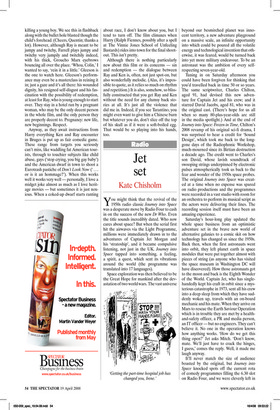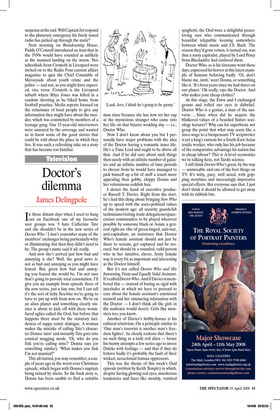Jet set
Kate Chisholm
You might think that the revival of the 1950s radio classic Journey into Space was a desperate move by Radio Four to cash in on the success of the new Dr Who. Even the title sounds incredibly dated. Who now cares about space? But when the serial first hit the airwaves via the Light Programme, millions were immediately drawn in to the adventures of Captain Jet Morgan and his ‘stratoship’, and it became compulsive listening, not just in the UK. Journey into Space tapped into something, a feeling, a spirit, a quest, which sent its vibrations around the world (the programme was translated into 17 languages).
Space exploration was then believed to be the Great Hope for mankind after the devastation of two world wars. The vast universe beyond our besmirched planet was innocent territory, a new adventure playground on a massive scale, an infinite opportunity into which could be poured all the volatile energy and technological invention that otherwise, it was feared, would be turned back into yet more military endeavour. To be an astronaut was the ambition of every selfrespecting seven-year-old.
Tuning in on Saturday afternoon you could have been forgiven for thinking that you’d travelled back in time 50 or so years. The same scriptwriter, Charles Chilton, aged 91, had devised this new adventure for Captain Jet and his crew; and it starred David Jacobs, aged 81, who was in the original cast. (There’s hope for us all when so many 80-plus-year-olds are still in the media spotlight.) And at the end of Journey into Space: Frozen in Time, Chilton’s 2008 revamp of his original sci-fi drama, I was surprised to hear a credit for ‘Sound Design’, which took me back to the longgone days of the Radiophonic Workshop, much-mourned since its Birtian destruction a decade ago. The credit went to Charles’s son David, whose lavish soundtrack of swooping strings underpinned by electronic pulses atmospherically took us back to the fear and wonder of the 1950s space probes. The original Journey into Space was created at a time when no expense was spared on radio productions and the programmes were recorded in a vast studio with room for an orchestra to perform its musical script as the actors were delivering their lines. The recording session itself must have been an amazing experience.
Saturday’s hour-long play updated the whole space business from an optimistic adventure set in the brave new world of alternative galaxies to a comic skit on how technology has changed us since the 1950s. Back then, when the first astronauts went into orbit, they left planet earth in space modules that were put together almost with pieces of string (as anyone who has visited the space museum in Washington DC will have discovered). How those astronauts got to the moon and back is the Eighth Wonder of the World. Captain Jet, who has singlehandedly kept his craft in orbit since a mysterious catastrophe in 1973, sent all his crew into a deep sleep from which they have suddenly woken up, travels with an on-board mechanic and his mate. When they arrive on Mars to rescue the Earth Saviour Operation which is in trouble they are met by a healthand-safety officer, a PR and media person, an IT officer — but no engineers. They can’t believe it. No one in the operation knows how anything works. ‘How do we get this thing open?’ Jet asks Mitch. ‘Don’t know, mate. We’ll just have to crack the hinges, I guess,’ comes the reply. Well, it made me laugh anyway.
It’ll never match the size of audience boasted by the original, but Journey into Space knocked spots off the current rota of comedy programmes filling the 6.30 slot on Radio Four, and we were cleverly left in suspense at the end. Will Captain Jet respond to the planetary emergency his finely tuned radio has picked up through the static?
Next morning on Broadcasting House, Paddy O’Connell introduced an item that in the 1950s would have sounded as unlikely as the manned landing on the moon. Two schoolkids from Croxteth in Liverpool were invited on to the Radio Four current affairs magazine to quiz the Chief Constable of Merseyside about youth crime and the police — and not, as you might have expected, vice versa. Croxteth is the Liverpool suburb where Rhys Jones was killed in a random shooting as he biked home from football practice. Media reports focused on the reluctance of local people to give any information they might have about the murder, which was committed by members of a teenage gang. Our 15-year-old interviewers were annoyed by the coverage and wanted us to know some of the good stories that could be told about the place in which they live. It was such a refreshing take on a story that has become too familiar.



















































































 Previous page
Previous page